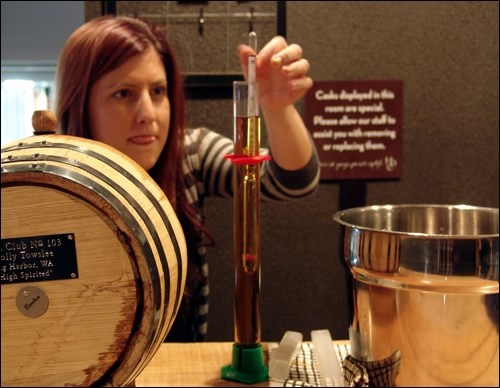Enjoy a good spirit and want to open up a distillery?
Squamish will soon play host to one of the only craft distillery programs in Western Canada.
The five-day workshop put on by Capilano University Continuing Studies and Executive Education is aimed at entrepreneurial types who want to get the low down on everything from the actual distillation process to the steps needed to get the business up and running.
The course is a partnership between the university and the Artisan Craft Distilling Institute.
Owners of Squamish’s newly opened Gillespie’s Fine Spirits, Kelly Ann Woods and her partner, distiller John McLellan, are graduates of the Washington version of the workshop.
“If you have any interest in craft distilling, either opening a distillery or being a distiller, or even any kind of side business to distillation, it is absolutely the best money you could spend,” said Woods.
Gillespie’s will be the location for the hands-on distilling portion of the course.
“You kind of need to come into a distillery as a reference point,” Woods said.
According to Woods, one of the most difficult parts of opening a distillery is getting licensing and dealing with all levels of government.
“The building codes haven’t been rewritten since 1941… and at the time [distilleries] took up whole city blocks. So this new artisan craft distilling movement, the building codes don’t support,” she said.
Woods said the modern day distillery is treated like a dynamite factory, so all of the laws and fire codes apply to this concept of a distillery which they aren’t anymore.
She said she wants to share with the people who attend the course what she has learned to save them some of the frustration she went through in the process of opening her business.
Despite the challenges along the way, Woods said she would do it all over again.
“I wouldn’t turn back,” she said.
“We are really picking up steam… there is this whole movement. Instead of spending money on booze from Russia and these big corporations we are bringing it into our hometowns.”
The seeming increase in popularity of sprits and distilling can be attributed to many factors including a return to ways of old.
Whisky was the main beverage of circa 1800 Canadian pioneers and distillers thrived, according to author Art Jahns, in his book The Windsor/Walkerville Connection. Even with prohibition in the United States, and Canadian temperance movements, distilleries did well in Canada. But in 1918, the Canadian government closed all distilleries and breweries as non-essential for the war effort, decimating the distilling business in the country, according to Jahns.
According to local historian Eric Andersen, until the 1950s liquor could only reach Squamish by steamship or train travellers. In the late 1800s and early 1900s the Squamish pharmacist dispensed liquor as “medicine.”
Deanna Burnett Keener, program facilitator from Artisan Craft Distilling in Washington, said trends and cultural influences, such as the popular ’60s based TV show Mad Men, also play into the current growing popularity of spirits.
“[The resurgence] also happened when there was a bit of nostalgia for cocktails,” she said.
The Squamish craft distilling workshop runs April 13 to 17. For more information go to www.capilanou.ca/distilling



